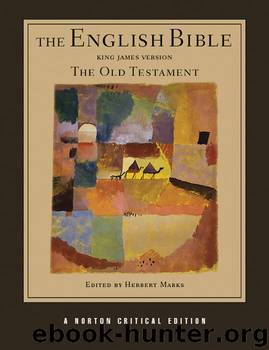THE ENGLISH BIBLE KING JAMES VERSION: Volume One The Old Testament by Unknown

Author:Unknown
Language: eng
Format: epub
ISBN: 978-0-393-52217-4
Publisher: W. W. Norton & Company
Published: 2012-05-23T16:00:00+00:00
[Since the KJV does not count superscriptions among the numbered verses, titled psalms are one verse shorter in English than in Hebrew. Verse paragraphs in this edition have been added by the editor.]
Book I (Pss 1–41). This is the longest of the Psalter’s five divisions, which were probably introduced toward the end of the Persian period (fourth century b.c.e.) as a parallel to the five books of Moses. The editor who established them by adding traditional doxologies or formulae of praise at the end of Pss 41, 72, 89, and 106 was guided by the traces of prior collections; thus, the divisions reflect successive stages in the book’s evolution. The two opening psalms, which lack superscriptions, stand as a preamble to the Psalter as a whole. They urge devotion to torah (1:2) and faith in God’s promise of an eternal kingship—the twin pillars of postexilic piety. By contrast, the older psalms that made up the original collection are all ascribed to David. Generically, individual laments and prayers for deliverance predominate over hymns.
Psalm 1. The two ways (v. 6). A didactic prologue to the entire Psalter, extolling the personal virtues of contemplation and study, and condemning the frenzied activity of the “ungodly.” 1:1 Blessed: lit. “happy” (cf. 32:1; 41:1; 128:1); righteousness as its own reward. 1:2 Law of the LORD: for the postexilic community, torah (lit. “instruction”) could mean the Pentateuch, but also, more broadly, God’s will as revealed in scripture (cf. 19:7–14; Ps 119)—including the psalms that follow. Meditate day and night: cf. Josh 1:8. 1:3 Like a tree…not wither: cf. Jer 17:8; image for the “silent” man in Egyptian wisdom literature. The “planter” would be the Lord. 1:5 Stand in the judgment: endure, or enter into, God’s justice, here with eschatological overtones.
Psalm 2. A second introductory psalm, again without superscription. Generically, it belongs to the category of “royal psalms,” which may have been recited during enthronement ceremonies (compare the complementary Pss 72 and 89 at the end of Books II and III). It celebrates the investiture of the new king, whom God adopts as his “son” in ancient Near Eastern fashion. Reinterpreted messianically following the extinction of the monarchy, it became a key text for early Christian exegetes, who often cited it along with Ps 110 as proof of Christ’s divinity (see v. 7 note). 2:1 Heathen: foreign nations. Imagine: lit. “utter.” 2:2 Anointed: Heb. meshia, “messiah,” a royal title; Israel’s kings were traditionally consecrated with oil; cf. 1 Sam 10:1; 1 Kgs 1:39. (Christos, the title given to Jesus, is the Greek translation; see Acts 4:25–27.) 2:4 Shall laugh: cf. 37:13; 59:8. The Lord: Heb. adonay, lit. “my lord” (though ancient versions use the divine name). 2:6 Zion: the temple mount; more generally, Jerusalem, the city of David (2 Sam 5:7) and God’s dwelling place (76:2; 132:13; cf. Ps 48). 2:7 The decree: of divine adoption—a tenet of royal ideology throughout the ancient Near East (cf. 2 Sam 7:14; Ps 89:26–27). Early Christians read the word “son” as a
Download
This site does not store any files on its server. We only index and link to content provided by other sites. Please contact the content providers to delete copyright contents if any and email us, we'll remove relevant links or contents immediately.
Twelve Days of Christmas by Debbie Macomber(3549)
The Kiss of Deception by Mary E. Pearson(2779)
ESV Study Bible by Crossway(2772)
Waking Up by Sam Harris(2448)
7-14 Days by Noah Waters(2407)
Holy Bible (NIV) by Zondervan(2109)
The Harvest: Taken by M.A. Church(1909)
The King James Study Bible by Thomas Nelson(1825)
21 (The List Series) by Rhonda James(1735)
Warrior of the Light by Paulo Coelho(1734)
Good with Words by Patrick Barry(1655)
Future Design by Unknown(1562)
The Falls by Unknown(1517)
Savage (Apex Predator Book 2) by David Meyer(1505)
My Daily Catholic Bible, NABRE by Thigpen Edited by Dr. Paul(1483)
King of Kings by Unknown(1467)
Bound by You(1454)
Skin by Unknown(1415)
The Holy Bible by King James Version(1381)
